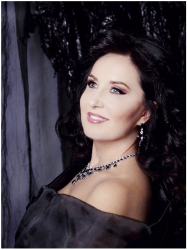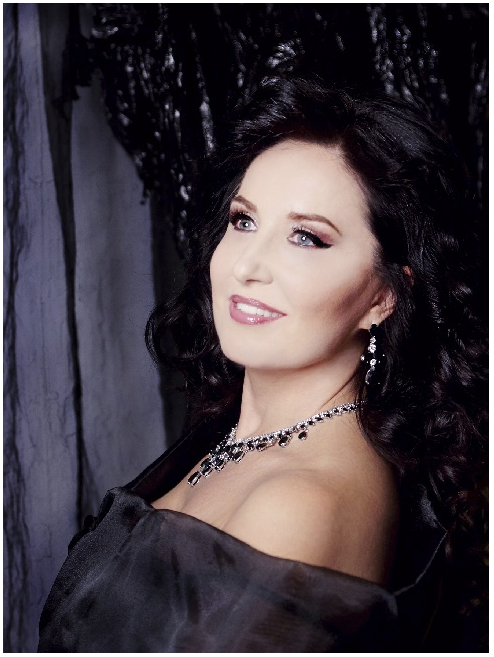 Switzerland Enescu, Chausson, Debussy, Fauré, Verdi: Elena Moșuc (soprano), Enrico Maria Cacciari (piano), Opernhaus, Zurich, 21.6.2018. (CCr)
Switzerland Enescu, Chausson, Debussy, Fauré, Verdi: Elena Moșuc (soprano), Enrico Maria Cacciari (piano), Opernhaus, Zurich, 21.6.2018. (CCr)

George Enescu – Sept chansons de Clément Marot Op.15
Ernest Chausson – ‘Le Charme’ Op.2 No.2, ‘Le Colibri’ Op.2 No.7
Debussy – ‘Romance’
Fauré – ‘Notre Amour’ Op.23 No.2, ‘Après un Rêve’ Op.7 No.1, ‘En Prière’, ‘Toujours’ Op.21 No.2
Pascal Bentoiu – ‘April’
Tiberiu Brediceanu – ‘Stancutas song’ (La Seceriş), ‘Floricica de pe apă’
Eduard Caudella – ‘Ochii albastrii sunt adorabili’
Verdi – ‘Ave Maria’ of Desdemona (Otello); Arias of Lucrezia ‘No … mi lasciate / Tu al cui sguardo onnipossente / O patrizi, tremate’ (I due Foscari); Arias of Leonora ‘Timor di me / D’amor sull’ali rosee / Tu vedrai’ (Il trovatore); Arias of Medora ‘Egli non riede ancora / Non so le tetre immagini’ (Il corsaro); Aria of Lady Macbeth ‘Trionfai’ (Macbeth)
If the name Elena Moșuc is only vaguely familiar to you or not at all, perhaps as a bel canto diva or Queen of the Night, then now would be a good time to give her operatic singing a listen, for it is soulful and expert. If you’ve already caught some of Moșuc’s career, from Zurich to Munich and crisscrossing Italy and the rest of Europe, then now would be an especially good time to pay closer attention, as she is taking artistic risks, setting high standards for herself in new vocal territory, and delivering mature and intelligent performances full of power.
Moșuc sang as part of the Zurich opera’s excellent series of recitals, the Liederabende, which have been expanded over the years to encompass more works and which draw respectable audiences; the quality is often supreme. Certainly in Moșuc’s case, the enthusiasm and interest were high, likely a result of her long career singing in this house, but also of the palatable nature of the Verdi set – who doesn’t like these arias – and the undying operatic obsession with divas and glitz. This was a recital with a costume change, one with a less buttoned-down audience and with the lavishing of several bouquets and rounds of applause. The good news is that they were fully deserved.
She began with a set of French songs by the Romanian composer Enescu, impressionist renderings of quirky 16th century French poetry; quirky because they include lines such as ‘ladies too lazy to write their friends’ or ‘let’s change the topic, we’ve sung of love too much’. There were moments when Moșuc could have embraced the playful text more and honed in vocally to a more intimate tone with less vibrato, but she had a fresh and lively touch in the lighter, sweeter songs of the set.
As the harmonic identity of the music changed, so did the colours and control of her voice, and in the rest of the first half of the set, when the accompaniment was at times Brahmsian and the tone of the texts more doleful, Moșuc drew the listener into her mechanical mastery; her French articulation was marvellous, the vowels sat wonderfully in her voice no matter what register she was singing in, and one heard how expertly she can link phrases together when various dynamics, meanings, moods, and even octaves send her racing or ambling along. A slow Fauré song, ‘Après un Rêve’, gave Moșuc a chance to close her eyes, get to the essence of a two-minute piece of music within the first bars, and deliver a gorgeously delicate poetic reading. Other songs witnessed piano notes in the head voice, arrived at and sustained with impeccable technique.
Moșuc was born in Romania, and linguistically this has served her well towards the integrity of her French- and Italian-language singing. It was all the more satisfying to hear her voice open up even more when she sang three songs in her native tongue. The four Romanian songs were harmonically vital and a compelling complement to the rest of the set. Additionally, with their fine piano accompaniments they made the argument just as well as the French pieces that art songs are so musically valuable as little worlds in themselves. Here and elsewhere, her accompanist Enrico Maria Cacciari did her nothing but favours. He shadowed perfectly the timing of his singer, and played as if the concert was his own without once usurping her position front and centre. If he was bored with the simpler Verdi arrangements, he never showed it, and was lucky to have a first half with piano music this good.
Observing the audience, it is hard to escape the impression that, for many, all of this was just a nice bit of window dressing for the real show, the Verdi arias. The move to this set, after an intermission and a new gown, now with silver instead of black sequins, was a sort of crescendo in itself coming off the first half. It showcased Moșuc’s bread-and-butter repertoire, taken from roles she has sung on major stages and arias she has recorded commercially. The fireworks and unfortunate camp of all of this, however, did not detract from Moșuc’s craftsmanship and finesse. A Verdi word like ‘sospiri’ is like dough in her hands, and she can shape it exquisitely in a moment that seems to slow down and zoom in. In her cavatina from I due Foscari, she brought consummate artistry to the dramatic storytelling of her song, particularly with repeated lines of text. When Verdi wants us to hear text like ‘your furore will soften even the grimmest hearts’ twice, he has good reasons, and composes the repetition to bring out a new power or dramatic element in such a line, sung now with menace, now with horror, now with pride, now with doubt. Moșuc’s Verdi avoids overcooking these dynamics for the most part, though her upper register and fortissimo would appear so effortlessly achieved that it must be hard to resist giving the audience more and more of what they want. Almost without fail, Moșuc opted for what little restraint and nuance were possible, even in passages that would invite her to get boastful. Line by line, stanza by stanza, Moșuc shows a mastery of bel canto and early Verdi, and in ways that are independent of her money notes at the top. It is worth mentioning that she even did so despite what appeared to be a stubborn tickle in her throat, which she cleared discreetly between every piece.
Not two but three encores showed the tug the audience exerted on their performer; they wanted more high C’s, more drama-on-demand, and they got it. And once again Moșuc made a smart artistic choice: her arias here were all so weighted and saturnine that she found a way to slowly reel the emotions back to a sombre centre while still delivering her vocal acrobatics. They were: an Act I aria from Linda da Chamonix by Donizetti, the final cabaletta of Anna Bolena, and Tosca’s ‘Vissi d’arte’. Music this mournful and simultaneously bold was a fitting way to close an evening of song so varied, ambitious, and winsome.
Casey Creel
